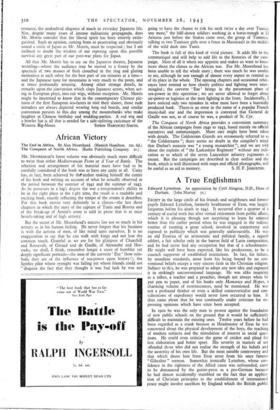African Victory
The End in Africa. By Alan Moorehead. (Hamish Hamilton. los. 6d.) The Conquest of Mirth Africa. (Burke Publishing Company. 2S.)
MR. MOOREHEAD'S latest volume was obviously much more difficult to write than either Mediterranean Front or A Year of Battle. The selection and arrangement of his material must have had to be carefully considered if the book was to have any unity at all. Unity has, in fact, been achieved by they author making himself the centre of his book and writing an account of what he- actually observed in the period between the summer of 1942 and the summer of 1943. As he possesses in a high degree the war c.rrespondent's ability to be in the right place at the right time, the result is a readable and exciting book, exactly reflecting the tempo of the events it describes. For this book moves very definitely to a climax—the last three chapters in which the story of the capture of Tunis and Bizerta and of the break-up of Arnim's army is told in prose that is at once breath-taking and of high artistry.
But the secret of Mr. Moorehead's success lies not so much in his artistry as in his human feeling. He never forgets that his business is with the actions of men, of like mind unto ourselves. It is no exaggeration to say that he can walk with kings and not lose the common touch. Grateful as we are for hii glimpses of Churchill and Roosevelt, of Giraud and de Gaulle, of Alexander and Hor- rocks, we shall, think, remember longer a score of humbler yet deeply significant portraits—the men of the corvette' Exe ' (how sym- bolic they are of the influence of sea-power upon history !), the Spitfire pilot whose eyesight was failing yet whose friends could not " disguise the fact that they thought it was bad luck he was not going to have the chance to risk his neck twice a day over Tunisia any more," the half-dozen soldiers washing in a horse-trough at El Aroussa just before the Stukas came over, the group of Tommies talking to two Tunisian girls over a fence in Massicault in the middle of the wild dash into Tunis.
The book is full of this kind of vivid picture. It adds life to the communiqué and will help to add life to the histories of the cam- paign. Most of all it whets our appetite and makes us want to know more about the climax to the African war. For Mr. Moorehead has been unable to tell the whole story'; there was much he was unable to see, although he saw enough of almost every aspect to remind us of its place in the whole. The opening chapters and occasional refer- ences later remind us how closely politics and fighting were inter- mingled ; the corvette Exe ' brings in the paramount place of sea-power in this operation ; we are never allowed to forget about air-power or logistics or the men fighting at the front. Incidentally, I have noticed only two mistakes in what must have been a hurriedly produced book. There-is an error in the name of a popular French music-hall star and the impression is conveyed that General de Gaulle was not, as of course he was, a product of St. Cyr.
The Conquest of North Africa provides a convenient summary of the African campaigns from 1940 to 1943, based mainly on official narratives and communiqués. More care might have been taken with details. The Coldstream Guards are erroneously referred to as " the Coldstreams "; there seems no doubt in the compiler's mind that Darlan's assassin was " a young monarchist'.';, and we are told about the exploits of " the Lancashire Regiment " without any indi- cation as to which of the seven Lancashire infantry regiments is meant. But the campaigns are described in clear outline and the book, which is well illustrated with maps and official photographs, will


























 Previous page
Previous page